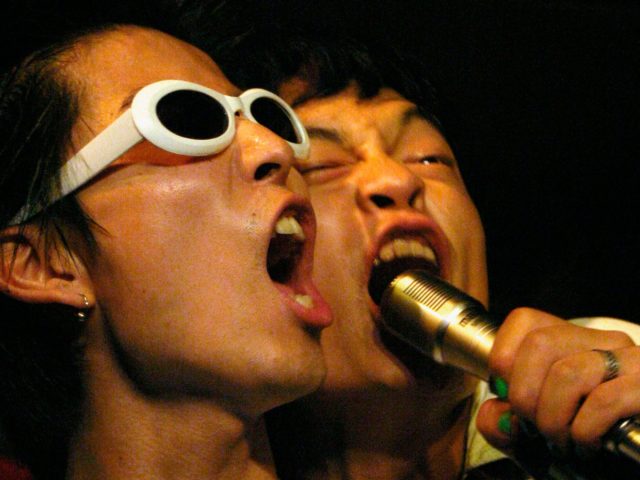The Chinese Communist Party began promoting a hip-hop anthem on Tuesday featuring 100 different rappers celebrating 100 years of communism, praising the “Red Army,” “high-speed trains,” and 5G technology.
The song, “100%,” is 15 minutes long and features rappers belonging to members of repressed ethnic minorities, there to urge the world to ignore the abundant evidence of human rights atrocities the Communist Party is currently committing against Uyghurs, Tibetans, and other non-Han ethnic groups. The song does not mention several of communisms greatest failures, including Mao Zedong’s Cultural Revolution and Great Leap Forward, which killed 45 million people.
The South China Morning Post reported that the song debuted on Weibo, China’s largest state-controlled social media network, this weekend, unleashing a torrent of condemnation for its low quality and messy production value. Weibo censors promptly began deleting such comments, but not before international media could document them.
China has spent the past five years attempting to curb, and later control, the rapid rise in popularity that rap music and hip-hop culture have experienced among the nation’s youth. Initially an underground artistic movement, the Communist Party began releasing government rap anthems in the late 2010s featuring quotes from dictator Xi Jinping’s speeches and homages to the Party’s convoluted bureaucracy, such as the songs “The Four Comprehensives Rap” and “The Reform Group Is Two Years Old.” Young people in the country largely ignored the government’s attempts to enter the rap industry, instead turning an independent reality television program, The Rap of China, into a surprise hit in 2018. The Party responded by banning “low taste” rap from television and coopting The Rap of China‘s stars, who have since publicly echoed communist propaganda on issues such as Taiwanese independence and Chinese repression in Hong Kong.
“China hopes to transform local hip-hop into a positive influence but will punish those who cross the line,” the Global Times, a government newspaper, warned in 2018.
“100%” is the Communist Party’s most recent bold attempt to break into the rap scene. The song does not yet appear to have an accompanying music video, but the record label behind it, Hip Hop Fusion, posted the audio track online this weekend, calling it a “pioneering work in the history of global music.” According to translations on foreign media of some of the lyrics, the song advocates the continuation of brutal communist repression and expresses deference to the Party.
“We used to look forward to the Red Army, a spring breeze all over the Earth. Keep tradition in mind, achieve socialism, as the red flag stays in my heart,” one rapper urges on the song, according to the Hindustan Times.
“New China must get lit,” another adds.
One of the rappers on the song, Max Ma Jun, represents Xinjiang, the westernmost Chinese province where the Party has built over 1,200 concentration camps to imprison millions of people belonging to Muslim ethnic minorities. Max Ma Jun reportedly raps about the importance of “loyalty to the country” on the track, a refutation of Uyghur calls for independence from communism given the outstanding list of human rights atrocities documented against them, including torture, rape, slavery, and forced sterilization.
Contrary to reports from independent sources, the Chinese state propaganda outlet Global Times reported that “100%” debuted to lavish praise for its “patriotic” content.
“The new cipher not only excited rap music fans, but also allowed netizens to see how pop culture can arouse young people’s patriotism in China,” the state newspaper claimed. The newspaper interviewed a rap artist who attempted to explain, “the song is more like expressing love for China, but not really telling the ‘history,’ you know?”
“Hip-pop is all about being real and true to your beliefs, which means it is even more suitable for such patriotic emotions, because that’s real,” the rapper, “Stonie,” was quoted as saying.
The Global Times quoted Weibo “netizens” effusively praising the song as “exciting” and “fun.”
“I’ve never heard a Chinese rap song that is so mainstreamed all way through, and it features many of my most beloved rappers. So exciting!” an alleged fan wrote on the social network.
In reality, the South China Morning Post documented more embarrassment than praise, followed by a wave of online censorship.
“One critic called the rappers ‘100 slaves’ for pandering to the country’s rising wave of nationalism,” the newspaper reported. Others simply complained that the song had too many people on it to sound like a coherent production.
The condemnation was significant enough for the founder of Hip Hop Fusian, Li Haiqin, to react, stating he was “shocked and disappointed” on his account on WeChat, another Chinese government-controlled social media outlet.
Follow Frances Martel on Facebook and Twitter.

COMMENTS
Please let us know if you're having issues with commenting.